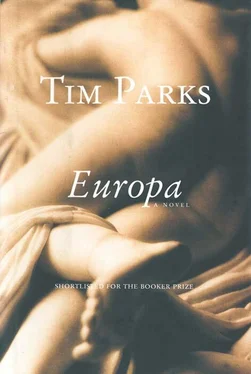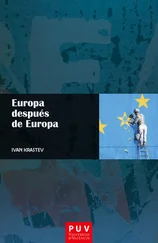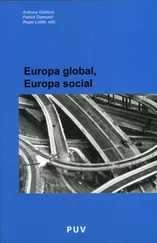Tim Parks - Europa
Здесь есть возможность читать онлайн «Tim Parks - Europa» весь текст электронной книги совершенно бесплатно (целиком полную версию без сокращений). В некоторых случаях можно слушать аудио, скачать через торрент в формате fb2 и присутствует краткое содержание. Год выпуска: 1999, Издательство: Arcade Publishing, Жанр: Современная проза, на английском языке. Описание произведения, (предисловие) а так же отзывы посетителей доступны на портале библиотеки ЛибКат.
- Название:Europa
- Автор:
- Издательство:Arcade Publishing
- Жанр:
- Год:1999
- ISBN:нет данных
- Рейтинг книги:3 / 5. Голосов: 1
-
Избранное:Добавить в избранное
- Отзывы:
-
Ваша оценка:
- 60
- 1
- 2
- 3
- 4
- 5
Europa: краткое содержание, описание и аннотация
Предлагаем к чтению аннотацию, описание, краткое содержание или предисловие (зависит от того, что написал сам автор книги «Europa»). Если вы не нашли необходимую информацию о книге — напишите в комментариях, мы постараемся отыскать её.
Europa — читать онлайн бесплатно полную книгу (весь текст) целиком
Ниже представлен текст книги, разбитый по страницам. Система сохранения места последней прочитанной страницы, позволяет с удобством читать онлайн бесплатно книгу «Europa», без необходимости каждый раз заново искать на чём Вы остановились. Поставьте закладку, и сможете в любой момент перейти на страницу, на которой закончили чтение.
Интервал:
Закладка:
Dimitra has this manner of interrupting herself to demand consent, as if always ready to hear an unvoiced chorus of bloody-minded rejection. Her most characteristic gesture in our long, tedious and above all contentious meetings is to offer her resignation so that she can then be begged to withdraw it, arid she invariably is begged to withdraw it, not because any of us loves her or wants her to stay or even remotely likes her, but because none of us is sufficiently dedicated to the notions of justice and solidarity we all talk about to take upon ourselves the onerous job of president, excepting of course Vikram Griffiths, who cannot be president, because too conflictual and too crazy, but who nevertheless, despite holding no official position in the union at all, is effectively our leader anyway. Or at least, the only person who does anything.
Right? Dimitra demands.
Georg quickly agrees that of course Dimitra had to go and see Professor Ermani.
It was my job, she adds, never satisfied with mere consent. I had to go and see him. Otherwise we might have put ourselves in a position of illegality
Quite, Vikram says, rubbing his sideburns. God save us from illegality. And having been to prison twice and proud of it, he winks, which Dimitra chooses not to notice.
So, while waiting for Professor Ermani, she says, to finish a phone-call in his office, she, Dimitra, noticed a memorandum on his desk on which she managed to read, albeit upside down and in her second language, the results of the vote taken only the previous day and only after a long and fraught debate (in which Dimitra herself had actually opposed Griffiths” plan, or at least its timing, had said that it would be provocative and dangerous and all in all sheer folly to go to Europe during term-time). Crucially, she had been able to see on Professor Ermani’s memorandum that the names of those who had voted for and against were clearly indicated.
Which can only mean, Vikram Griffiths butts in, that some shit at the meeting went straight to Gauleiter Ermani afterwards to report. There is clearly a traitor among us, a spy.
Who is it? He covers both nostrils with thumb and forefinger and sucks hard to clear his sinuses.
Who was at the meeting? Colin asks in what is a Brummie Italian now, and he gives me a little wink of hello from above a facile moustache, too neatly trimmed, because Colin is “the person with whom I occasionally indulge in tottie-talk , or pork-talk as he calls it, a supremely blokish recounting of our various amorous adventures.
Everybody was at the meeting, Dimitra says, and even anybody who wasn’t could have found out who voted for what, within a name or two, from the others.
The point is, Vikram Griffiths announces — and it’s not hard to imagine, I tell myself, that he is actually quite happy to be away from the difficult separation proceedings with his second wife, the acrimonious child-custody battle with his first, and above all happy, I reflect, to find himself involved in a drama — our struggle with the University of Milan — where he is inconfutably on the side of justice and morality, since in the end this is what all of us long for, is it not, to be engaged in a drama where we know what we want and what we’re doing, and are quite sure we are in the right and can feel a strong sense of purpose and identity and self-esteem and heroism even. How else explain, I ask myself, all the religious crusades and wars pursued up to and far beyond the point of madness, the environmental movements and concern for animal welfare, not to mention all the novels about the same? How else explain this enthusiasm for Europe? — The point is, Vikram says, that from now on we will have to behave as if they knew everything we are doing and saying. And well have to find out who it is. He grins determinedly, digging his fingers into his dog’s fur: It’s going to be a witch hunt.
But the moment he says the word ‘witch’ I’m thinking of her again. Yes, here on the big back seat of this big ugly modern coach crossing Europe, in this controlled environment, so called, of ducts and vents and conditioned air, this triumph of modern mechanics, I’m thinking of her again, as if a great divide had slid down between myself and the others, some invisible screen with enormous and surely marketable capacities for insulation, or as in a dream where one is shouting screaming clawing unheard unseen only inches from people behaving politely at mundane cocktail parties.
But what do I think of when I think of her like this, suddenly isolated, shut away against my will, or in some curious perversion of the will, in this claustrophobic space, this living tomb I am inexplicably digging for myself? What do I think of? What does it really mean, I ask myself in sudden angry rebellion, to say that you me thinking of her? What is this relation between the enigma that is yourself, this voice of yours, and the enigma that is her, her body, her laugh, the area she occupies in space? Why don’t you turn your mind inward now, I suddenly decide, to resolve this once and for all, to confront, once and for all, these moments of sudden and tremendous alienation, so that you can then clear your thoughts and turn them freely to the pressing questions of your colleagues and your job and your future and your ability to maintain in the manner to which they are accustomed the family you have left, not to mention the wider issues of Italy and of Europe and of how you should behave on this trip in this coach where you are going to support a cause that not only do you not believe in but which you do not even remotely care about, since the only thing you care about, I tell myself, quite ruthlessly now, however much you might like to care about other things, as for example the new furniture you must choose for your flat, and the small car you would like to buy, and your daughter, yes, your daughter, the only thing you care about, I tell myself, is her , or rather what happened to you with her.
And what did happen? Do I even know? Perhaps not. Definitely not. Perhaps I shall never know what happened to me with her. Only I know that of all people I have known she was the one I was happiest with, the person I most idealized, the person I was prepared at the last to leave my wife and daughter for, and simultaneously; yes, exactly simultaneously, and both lines of thought are at once attached to and separate from a thousand corroborative details (words images songs smells moments situations), I am thinking that she is the person who most betrayed me, who most completely and so carelessly destroyed me, the person who most built me up and then casually blew me away, blew me to smithereens, made a nothing of me. Because if a man, I reflect, is already next to nothing when he can’t take his work seriously and when people tell him, albeit kindly (and one is thinking here of old friends and family), that he has failed in his vocation , which was to have been, my vocation, but here one has to laugh, to make some sort of contribution to classical studies, so called, and above all, or so I once wrote on a piece of paper for others more important than myself who might have found a research position for me, to reconstruct, so far as such things can be reconstructed, the psychology of the ancients, to savour their minds and the way they lived inside the natural world, at home in it in a way we never can be, the patterned constellations over their heads throbbing with deities, the deep wells they drew their water from encircled by serpents, and not a single holy text (I’m thinking of pre-Orphic times) or social manifesto, or sniff of political correctness to slip a credit card between themselves and the sacred — if, as I was saying (and how relieved I am when I can digress a moment, when my mind, however briefly, finds some other channel to flood) — if a man is nothing when he can no longer follow even this most tenuous of vocations, classical scholarship, or some similar respectable spin-off, as for example teaching, or translating, or even writing a decent text-book, any sort of respectable and remunerative occupation that might have grown out of that presumptuous vocation, then he is doubly nothing when all at once at forty-three he finds himself leaving his wife and children, he finds himself without his family, so deeply betraying and betrayed that he himself cannot help, cannot help , I tell myself, committing the ultimate betrayal of all, which is not falling into somebody else’s bed (how remarkable that one should ever have imagined such a thing), but abandonment, abandonment. And certainly even if one never could and indeed one never would say that this is her fault any more than mine, or even see much point frankly now in attributing blame to anyone, still it is inescapably true that she had to do with it, with what has happened to me, she still has to do with it, she still holds me under her spell, she is or was and I don’t really know what I’m saying now or what I might mean by this, but it seems to me she is or was or might still be my access to the sacred, the irreducible element in my long negotiation with the other, by which perhaps I mean death, or nature, some part of life’s interminable equation that cannot come out until this harping voice, which is my mind, or part of it, is stilled forever. So that when I think of her, as I was trying to say, it is a witch I think of, a witch I cannot stop thinking of. A witch I am endlessly hunting. And at that very moment Colin leans forward and says her name.
Читать дальшеИнтервал:
Закладка:
Похожие книги на «Europa»
Представляем Вашему вниманию похожие книги на «Europa» списком для выбора. Мы отобрали схожую по названию и смыслу литературу в надежде предоставить читателям больше вариантов отыскать новые, интересные, ещё непрочитанные произведения.
Обсуждение, отзывы о книге «Europa» и просто собственные мнения читателей. Оставьте ваши комментарии, напишите, что Вы думаете о произведении, его смысле или главных героях. Укажите что конкретно понравилось, а что нет, и почему Вы так считаете.












